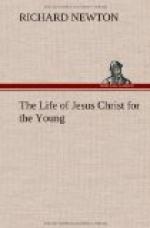You know how it is when we are trying to understand the music to which a particular tune has been set. There is always one special note in a tune, which is called the key-note. The leader of a choir, when they are going to sing, will strike one of the keys of the organ, or the melodeon they are using, so as to give to each member of the choir the proper key-note of the piece of music they are to sing. It is very important for them to have this key-note, because they cannot have a proper understanding of what they are to do without it. This holy sacrament of the Lord’s Supper is like a solemn song. And the key-note of the music to which the song is set is this word—remembrance. It teaches us that the sacrament of the Lord’s Supper is a memorial service. And, in going through the music to which the song of this service has been set, every note that we use must be a memorial note. And the language used by our blessed Lord when he established this Supper, or sacrament, must be explained in this way. When he broke the bread and gave it to his disciples, saying—“This is my body, which is given for you: this do in remembrance of me,” he meant that we should understand him as saying—“This is the memorial of my body.” And when he gave them the cup, and said—“This is my blood of the New Testament,” he meant that we should understand him as saying—“This is the memorial of my blood.” And we are sure that this was the meaning, for two reasons.
One reason for believing this is that this was the way in which similar words had been used in the Jewish Passover, which Jesus and his disciples were then keeping.
In the Passover service, when the head of the family distributed the bread, he always said—“This is the bread of affliction.” When he distributed the flesh of the lamb, roasted for the occasion, he used to say—“This is the body of the Passover.”
But every one knows, and every one admits, that the Jewish Passover was a memorial service. It was kept in memory of the wonderful deliverance of their forefathers from the bitter bondage of Egypt. And the words used at that service were memorial words. And so, when Jesus, a little while before, had given to his disciples the Passover bread, saying—“This is the bread of affliction:” he did not mean to say that that was the very same bread which their forefathers had eaten, in the time of their affliction in Egypt. What he meant to say was—this is the bread which you are to eat in memory of your forefathers’ trial and deliverance. And when he gave to each of them a piece of the sacrificial lamb, saying, “This is the body of the Passover;” he did not mean that in any mysterious, or supernatural sense, that was the very lamb of which their forefathers had eaten on the solemn night of the Passover; he only meant that it was the body of which they were to eat in memory of the Passover. The Passover was a memorial service; and the words used at the Passover were memorial words.




